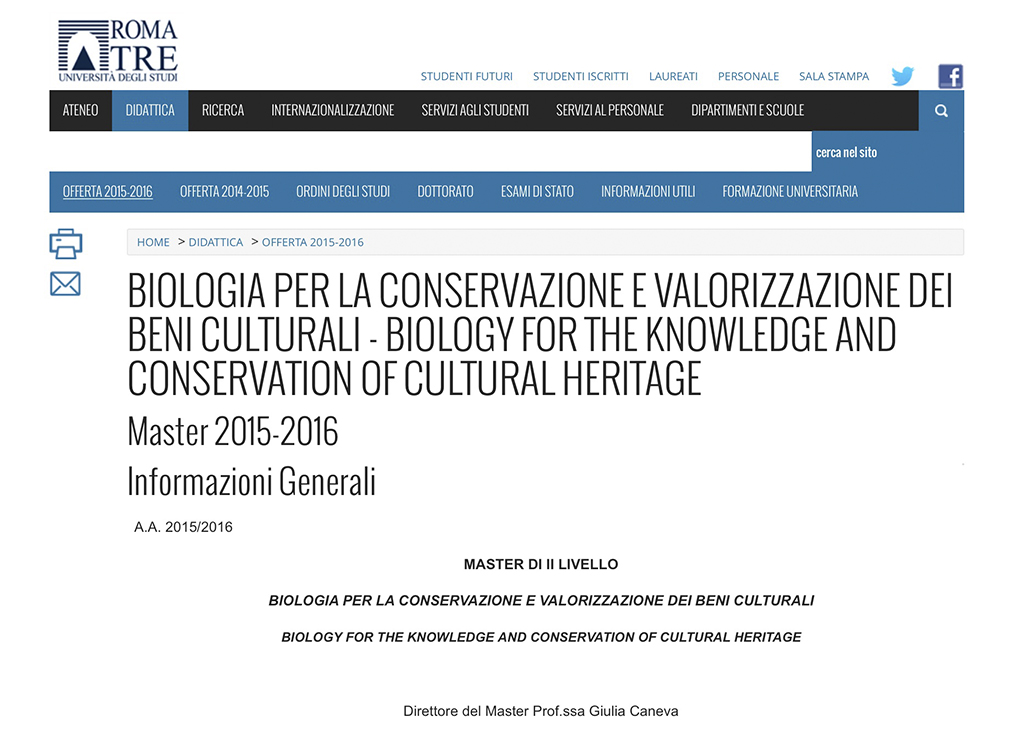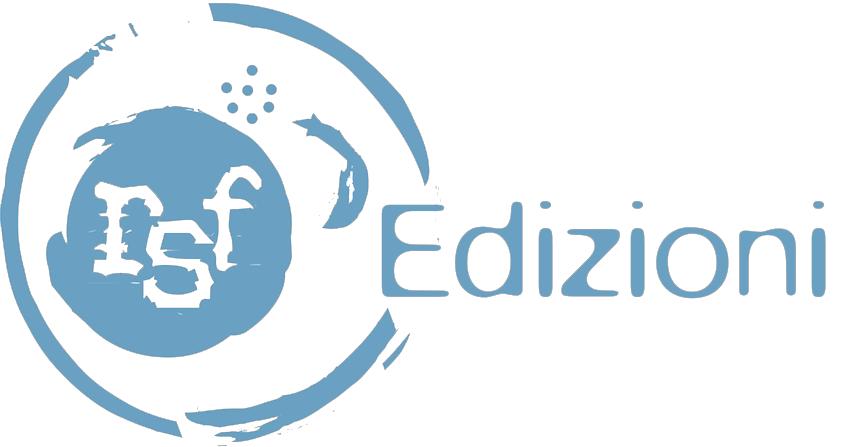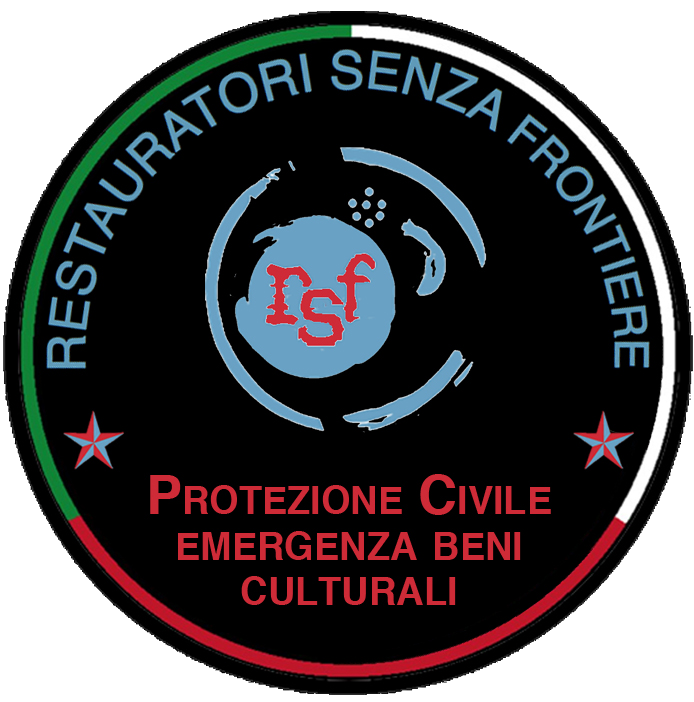BIOLOGY FOR THE KNOWLEDGE AND CONSERVATION OF CULTURAL HERITAGE

The international Master’s course will be offered for the academic year 2015/2016
This institutional master will take place at the Science Department of the Università Roma Tre. ICCROM (International Centre for the Study of the Preservation and Restoration of Cultural Property), CUEB (European University Centre for Cultural Heritage), ONB (The Italian National Order of Biologists) gave his patronage.
Professor Giulia Caneva (Università Roma Tre) is the Director of the course.
Contact details for the administrative office of the course are as follows: Segreteria del Master Internazionale, Dipartimento di Scienze, Università Roma Tre, viale Marconi 446, 00146, Roma.
Sigg.ri Simona Cecconi e Francesco Mattu Tel. 06-5733 6428, fax 06-5733 6365, e-mail: collegio.biologia@uniroma3.it
web site: http://www.uniroma3.it/schedaPostLauream15.php?pl=590&facolta=009444
The members of the academic council are:
|
Name |
Faculty/Institute of origin |
|
Prof.ssa Giulia Caneva (Chair) |
Univ. Roma Tre – |
|
Prof. Paolo Visca |
Univ. Roma Tre – |
|
Prof. Alicia Acosta |
Univ. Roma Tre – |
|
Prof.ssa Simona Ceschin |
Univ. Roma Tre – |
|
Prof. Andrea Di Giulio |
Univ. Roma Tre – |
|
Prof. Giancarlo Della Ventura |
Univ. Roma Tre – |
|
Prof.ssa M. Antonietta Ricci |
Univ. Roma Tre – |
The advisory board will also include the following members
|
Prof.ssa Laura Sadori |
Univ. La Sapienza, Roma |
|
Dott.ssa Giovanna Pasquariello |
Ist. Naz. Grafica Mibact Roma |
|
Dr. Pietro Sapia |
Ordine Nazionale Biologi |
|
Dr. Gamini Wijesuriya |
ICCROM, Rome |
|
Dr. Matteo Montanari |
Biores- Bologna |
-
Professional roles accessible to graduates of this course
This Master’s Degree is designed to prepare the student for specific professional roles, which are characterized by a high level of competency in the biological issues, related to the conservation and the enhancement of cultural heritage.
Graduates will be able to find appropriate employment with public and private organizations in the fields of archeology, art history, library and museum sector, with the possibility of further career developments on a national and international scale.
The courses, seminars, and internships of the Master’s have been conceived with the intention of providing the necessary knowledge, methodologies, and instruments:
-
for the analysis of biological material in a heritage context to carry out investigative sampling and environment reconstruction;
-
for environmental planning in the context of archaeological sites and monuments;
-
for the analysis of problems regarding the biodeterioration of heritage sites;
-
for techniques for the prevention and control of biological damage in the museum environment as well as at heritage and archeological sites;
-
for conservation issues and the enhancement of historical gardens and parks, monuments, and archeological sites;
-
for the recognition of the intangible heritage patrimony connected to the natural environment
-
Educational activities
This course requires the physical presence of students throughout. The tuition phase will take place in the classroom and consist of a series of modules and seminars for a total of 250 hours, and a further 80 hours dedicated to applied studies with analyses and sampling, aimed at putting into practice the theoretical notions learned during the course.
The time spent both in the classroom and in the laboratory should be complemented by individual extra-curricular study on the part of the student. The programs conclude with a final exam consisting in the completion of a written thesis presented in powerpoint format, to which 20 CFU will be attributed.
The academic program of the Master’s course will include the following study areas.
A1 and A2) tuition and seminars (study and research):
Conservation principles
Basic principles on the alteration of materials 2
Taxonomy of Biodeteriogens 6
Deterioration processes of materials 4
Preventive conservation in different environments 2
Principles of aerobiology 2
Prevention and control methods 2
Diagnostic techniques for biodeterioration 2
Recent developments in conservation issues 2
Total 1st module 22 credits
Knowledge for the enhancements
Bioarchaeology and Dendrochronology 4
Intangible cultural heritage 4
Nature as cultural heritage 4
Total 2nd module 12 credits
Total 34 credits
A3) Applied experimentation Internship:
|
n° |
Aims of the internship |
Institute at which the internship will take place |
CFU |
hours |
|
1 |
The acquisition of practical experience with issues connected to the conservation and enhancement of cultural heritage |
Scientific laboratories, Mibact, University, CNR, ENEA (to be completed) |
6 |
150 |
This internship will take place at one of the sites listed, from which the student will choose during the initial phase of the Master’s.
A) Conservation of monuments and archaeological sites
B) Conservation of antiques and artworks, printed material and museum artifacts
C) Development of museum displays
A3) Final Essay (Thesis) 20 credits
The final essay will be a written thesis completed under the supervision of an academic advisor assigned by the Didactic Council and will be presented orally with the aid of a PowerPoint presentation. The subject of the essay will be related to one of the themes developed during the course and will be in line with one of the subjects indicated above.
Student evaluation
Tests will be given to ascertain the student’s acquisition of knowledge at the end of the series of lessons in each subject group. At the end of the course students will sit a final exam, which will consist in the composition and presentation of a thesis exploring a theme covered by this course. The thesis will be composed under the supervision of an academic advisor who will be one of the professors of the course.
-
Opening date and duration of course
-
Academic activities will begin 15th February 2016 and end 30th June 2016. Each week there will be 16 hours of tuition in the classroom or the laboratory, which are planned to take place on Thursday afternoon, Friday (full day) and Saturday (morning). These activities may be extended with half or full days during the week on an ad hoc schedule, and may include field activities.
The internship will take place between the months of July and November 2016.
The final exam will take place in the month of December 2016.
-
Prerequisites and enrollment limits
The course is aimed particularly at post-graduates in the fields of Biology, Biotechnology, the Natural, Environmental, Agrarian and Forestry Sciences, and Museum and Heritage studies, who have obtained their degree in an Italian university or have obtained a recognized equivalent foreign degree. Authorization must be granted by the academic council for the enrollment of post graduates in the fields of Physics, Chemistry, Geology, the Arts, Geography, Architecture, Engineering, if the applicant’s study program or professional experience are in line with the objectives of the course.
Deadline for application will be send to the secretary until the 31 January 2016 see art.3 of the admission announcement web site: http://www.uniroma3.it/schedaPostLauream15.php?pl=590&facolta=009444
This is an international Master’s degree, and will be taught in English (eventually in Italian language, in absence of foreign students)The maximum number of enrollments for the Master’s is 20 students. Selection of applicant’s will be carried out through interviews (in person or with Skype) and evaluation of student’s curriculum vitae.
The minimum number of enrollments for activation of the course is 12 students.
-
Enrollment fee
1. The enrollment fee is € 2,500.00 (two thousand five hundred euros).
2. The official tax must be paid before enrollment.
3. The enrollment fee will not be reimbursed in the case of a voluntary renunciation, or in the case of a failure to provide full documentation for enrollment as required by the student’s administrative office.
4. A certificate on parchment can be acquired from the Diplomas office on payment of a € 25 fee.











